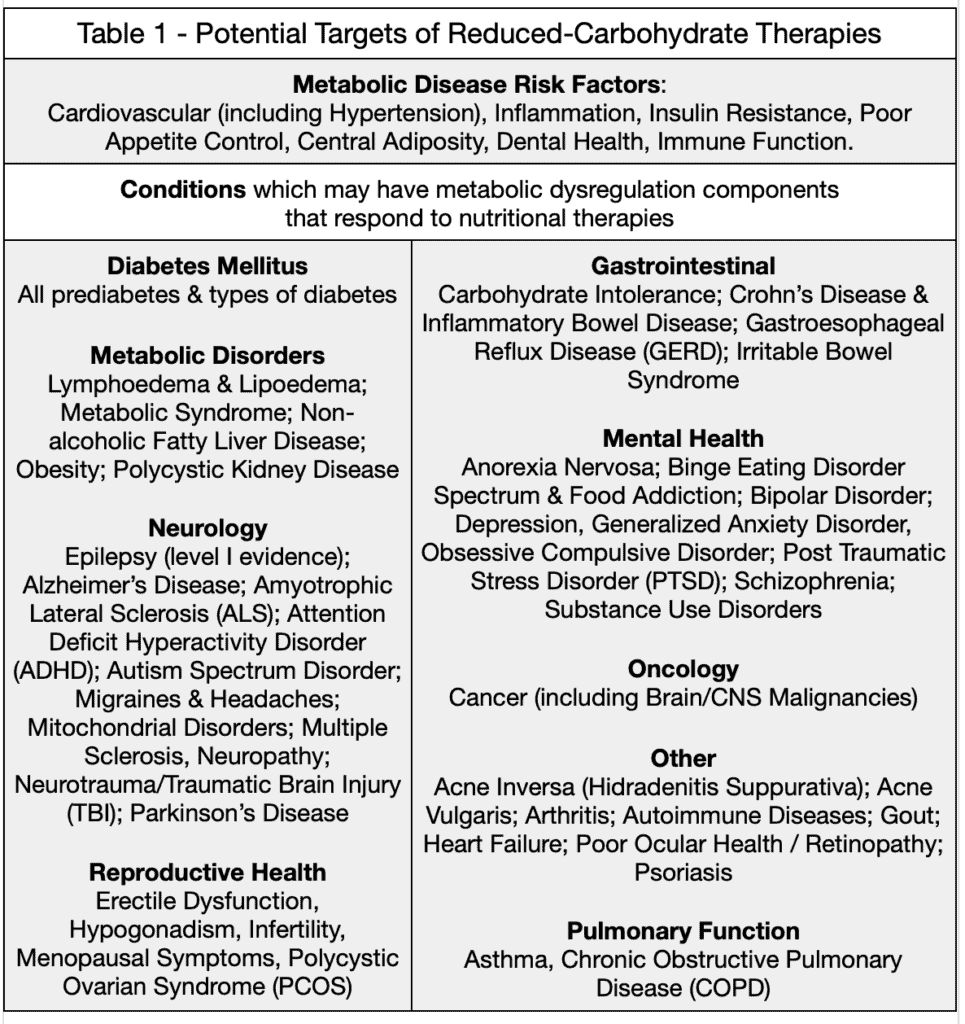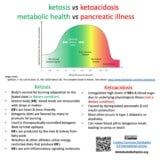Food First Trends for 2024 – An HBS WA Roundtable Discussion

The Harvard Business School Women’s Association (HBS WA) sponsors a series of alumni roundtable discussions including on the Future of Food. At our January meeting we discussed food first trends for 2024 and upcoming topics we’d like to cover. Based on our discussions, I’ve included the metabolic-health-related trends below.
- Over 40 chronic conditions respond to nutritional therapies – organizing the flood of research
- Using therapeutic nutrition to put diabetes in remission
- Metabolic Psychiatry continues to gain steam
- Profits from metabolic health will remain challenging, while cost savings abound.
- Emphasis on bio-individuality & measurement continues
- Suggested future of food topics.
We can expect to hear more about therapeutic dietary patterns, as outlined in the first 3 food trends.
1. Over 40 chronic conditions respond to nutritional therapies
Research – Published evidence continues to mount that many chronic conditions have metabolic dysregulation components that respond to nutritional therapies.

Save time with these metabolic health research portals
These metabolic health research portals organize over 4,000 studies by 40+ conditions with a metabolic component.
- Curated References Resource – Therapeutic Carbohydrate Restriction
- Top 2,000+ studies in humans.
- Downloadable handouts – 7 by condition. Research round ups for proceeding 3 months
- Metabolic Multiplier group library on Zotero.org
- 4,600+ studies in humans
- Group library in popular citation manager, Zotero.org
- Includes all studies in #1 above. Sophisticated search capabilities
- Group library with 13,500+ citations in humans & animals
Our thinking in organizing metabolic health factors.
2. Using therapeutic nutrition to put type 2 diabetes in remission
Two January 2024 publications using low-carb therapies to put Type 2 diabetes in remission.
Background – A cluster of metabolic conditions often occur together: metabolic syndrome / pre-diabetes/ insulin resistance; obesity; diabetes (type 2, type 1, LADA); Cardiovascular disease risk factors, liver, kidney, & reproductive function. A (nutritional) protocol that is effective for one may be effective for others.
Publication – Low-Carbohydrate and Ketogenic Dietary Patterns for Type 2 Diabetes Management, made the cover of Federal Practitioner’s 40th anniversary edition this month (January, 2024). More on why we think it is important. (Metabolic Multiplier was deeply involved in its writing, so we are partial!) It includes:

- Practical guide for clinicians
- Overview of the literature
- Deprescribing guide
- Case study within the Veterans Affairs system
- Can include omnivores, vegetarians, carnivores, & vegans.
This guide references three dietary patterns which have been shown to impact T2D in peer-reviewed literature.
- Low-fat, low-calorie dietary patterns – dietary orthodoxy
- Bariatric surgery to reduce food intake – has shown to be efficacious
- Low-carb and ketogenic therapeutic nutrition – gaining traction
“An eye-opening investigation into the history of diabetes research and treatment by the award-winning journalist and best-selling author”
Goodreads review
Book – Rethinking Diabetes: What Science Reveals About Diet, Insulin, and Successful Treatments by Gary Taubes. January 2024.
3. Metabolic psychiatry continues to gain steam
Article – NPR published a great overview “Patients say keto helps with their mental illness. Science is racing to understand why“
Announcement – Harvard Medical School and McLean Hospital (US’s #1 psychiatric facility) announced the creation of a Metabolic and Mental Health Program. The Program Director is psychiatrist Dr. Chris Palmer, MD. The treatment is based on his best-selling book, Brain Energy, and therapeutic nutritional ketosis. Stanford Medical School already offers metabolic psychiatry with psychiatrist Dr. Shebani Sethi, MD
Book – Change Your Diet, Change Your Mind: A Powerful Plan to Improve Mood, Overcome Anxiety, and Protect Memory for a Lifetime of Optimal Mental Health by Psychiatrist George Ede. MD. January 30, 2024.
Non-Profit Accelerator – Metabolic Mind is funding multiple clinical trials, education through their website and YouTube channel.
We are a nonprofit transforming the study and treatment of mental disorders by exploring the connection between metabolism and brain health. We leverage the science of metabolic psychiatry and personal stories to offer education, community, and hope to people struggling with mental health challenges and those who care for them.
Metabolic Mind, January 2024.
Background – Low-carbohydrate nutritional therapies for neurological conditions are often higher in saturated fat than those used for metabolic conditions like diabetes. In our organization of the low-carbohydrate research for neurological conditions includes epilepsy (>100 years of research), neurodevelopment, neurodegenerative, neurological, and mental health.
Mitochondrial health theory of metabolic health – “The bestselling book, Brain Energy (November 2022) unites our existing knowledge about mental illness within a single proposed framework: Mental disorders are metabolic disorders of the brain. This theory guides us to metabolic interventions that improve mitochondrial health including nutrition and behaviors such as exercise.” BrainEnergy.com
4. Profits from metabolic health will remain challenging, while cost savings abound.
Improving metabolic health with therapeutic nutrition
Food Companies – Real food has a shorter shelf life and more expensive ingredients such as produce and saturated fats. It engages the bodies natural satiety mechanisms so individuals naturally choose to eat less.
Healthcare – Education, personalized medicine, and preventative medicine take more time up front to diagnose route causes. Long term patients are more independent, need fewer visits and less medicine/procedures. Health-span is extended and converges with life span as we saw before the onslaught of modern chronic diseases. Virta Health and Doctor Tro have documented savings with use of their apps.
Agriculture – Regenerative agriculture products may cost more to produce than industrial agriculture. Restored soil health & use of animal-based fertilizer reduces use of petroleum-based fertilizers and preserves top-soil.
Background – What is metabolic health? A plain language definition. A biochemist’s definition.
Standard American Diet & status quo
Higher profits for agriculture, healthcare / pharmaceutical companies, and large food companies.
Food companies – Ultra-processed foods use cheaper, subsidized ingredients including grains, sugars, and seed oils. Additives extend shelf life. Hyper-palatable combinations of sugars and salt engage gut microbiome signals to keep customers coming back for more.
Agriculture – Industrialized agriculture and food processing costs less but may involve higher externalities such as pollution & consumption of petroleum-based fertilizers and pesticides.
Healthcare – Save money up front with short appointment times & prescription/procedure formulary for each condition. Long term sick care includes more pharmaceuticals & procedures.
5. Emphasis on bio-individuality & measurement continues
Nutrition and lifestyle behaviors powerfully affect our metabolic health
We’ve known that lifestyle differences and genetics explain part of bio-individual difference between people. Also that nutrition can promote or degrade health.
Recent research shows what works for an individual can change over weeks and months. This point is powerfully demonstrated by Physiologic Adaptation to Macronutrient Change Distorts Findings from Short Dietary Trials: Reanalysis of a Metabolic Ward Study. An author, Nick Norwitz, MD, PhD explains in this video.
This evidence shows us that the design of future dietary research should be altered. For example, at least a 3 month wash out period is needed in dietary crossover trials between high-carb and low-carb arms of a study. Did using a low-carb diet first improve the subjects’ metabolic capacity to handle subsequent carbohydrates effectively?
This example shows how the order of a cross-over trial can dramatically affect results. Hopefully these results will affect future study design and funding.
Measurement – Understanding bio-individual differences can help facilitate improvements. For example, Personalized coaching apps, continuous glucose & ketone monitors, fitness trackers, sleep and heart rate monitors, meditation apps, and blood work go hand in hand with a food first approach. These measurement tools help people understand the impact of food on them specifically.
In 2024, researcher’s understanding of the gut microbiome is in its infancy.
Future suggested food trend topics
- With the science and public perceptions of what is healthy changing so dramatically from decade to decade, how do food companies cope with the changing landscape?
- Impact on food companies of drugs like GLP-1 agonists used to treat metabolic conditions uncertain.
- Understanding the debate between “Real food” vs. Ultra Processed Foods (UPF’s) and added sugar.
- How does fasting fit in? 12 hours over-night, intermittent fasting, alternate day fasting, etc. Is therapeutic fasting ketosis similar to therapeutic nutritional ketosis?
- More on the food-mood connection and metabolic psychiatry.
- Individualized health care for those who can afford it. Outside of traditional primary care model. While gut microbiome & genetic research are very early on what insights can we take now?
- Circadian rhythms – Sleep and meal timing are important to chronobiology.
- Sustainability – The debates get spicy: reducing chronic disease with therapeutic nutrition, regenerative agriculture (includes ruminants / beef), plant-based (less ruminants / beef). Are there multiple valid approaches to improve the environmental impact of our food chain?
- Protein
- An overview of engineered proteins, organized courtesy of an alumna volunteer with experience in the field.
- Importance of protein to women, especially as we age. Sarcopenia, nutrition, and weight training.
- Bio-availability of various protein sources.
- Are refined carbohydrates & sugar addictive?
- Suggestions for speakers and topics are always appreciated!
Useful background in the mean time
- How Sugar & Processed Foods Impact Your Health, a recent interview between Robert Lustig, MD and Andrew Huberman, PhD. Buzz continues around using GLP-1 agonists to treat metabolic conditions. Recent categories of pharmaceuticals, GLP-1 and Semaglutide (Ozempic, Wegovy, Tirzepatide) “act on the brain & the gut to affect satiety…. The primary action is on the gut. GLP-1 decreases the rate of gastric emptying.” Nutrition is digested by slowing passage through the gut. Andrew Huberman, PhD & Dr. Robert Lustig discuss the efficacy, expense, and ease of use.
- Importance of protein for women – Book Review: Forever Strong by Dr Gabrielle Lyon by a Scottish doctor
2022 Future of Food speaker highlights
- Nina Teicholz, best-selling journalist on Dietary Guidelines and saturated fats in human nutrition
- Beth Sauerhaft, American Farmland Trust on Agricultural Policy
- Joanna Bromley, co-founder of The Better Meat Co on alternative proteins
- Cecile Seth, Metabolic Multiplier on Tuft’s Food Compass and useful nutritional labeling
If you are an HBS alumna or alum, then we’d love to have you join us and the HBS WA. (I’ve also found their Healthcare Roundtable very informative.) If not then I’d love to hear your input through contact us.










